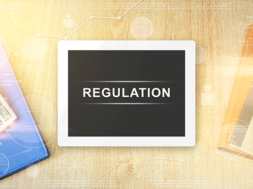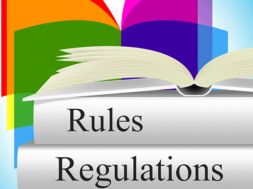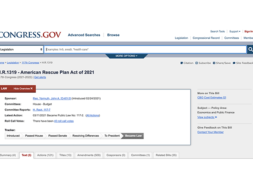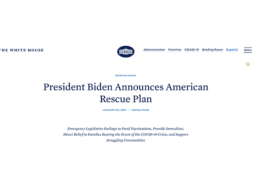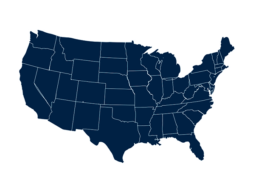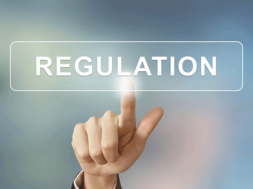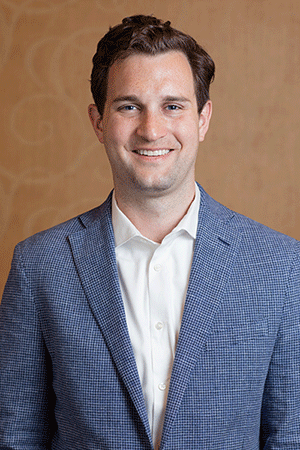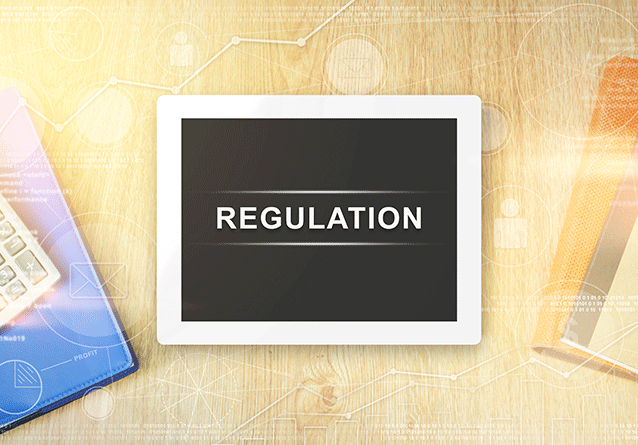
What to Expect With Negotiated Rulemaking at the Department of Education
By John Huston, Vice President of Government Relations, CECU
In August, the U.S. Department of Education (“Department”) made its first major move during the Biden Administration to formally rewrite Trump Administration-era federal student aid rules by announcing the formation of a negotiated rulemaking committee that will be known as the “Affordability and Student Loans Committee.” Unlike most federal agencies, whenever the Department wants to make changes to regulations impacting the Title IV federal student aid programs it must go through the arcane process of negotiated rulemaking. Any regulations that are finalized by this proceed take effect under the timeline dictated by the master calendar.
What is happening with the Affordability and Student Loans Committee?
The Department recently announced the selection of negotiators to represent 16 distinct constituencies on the Affordability and Student Loans Committee. The Committee is set to meet during October 4-8, November 1-5, and December 6-10. Given the long list of topics under consideration and the contentious nature of some of the regulations, it is unlikely that the Department will reach consensus.
The Department will likely attempt to publish final regulations on at least some accountability measures prior to Nov. 1, 2022, so that the regulations can become effective on July 1, 2023. However, the Department already has an ambitious list of regulatory priorities which will make accomplishing everything on its to-do list very challenging.
The Affordability and Student Loans Committee will consider changes on the following regulatory areas, which are briefly analyzed below.
Borrower defense to repayment
The Department’s regulations on borrower defense to repayment enable borrowers to have their loans discharged if they were defrauded or misled by the institution they attended. Under the current regulations, borrowers must generally apply for borrower defense relief. Whenever the Department receives an application, it provides the institution an opportunity to respond before making a final determination on loan relief.
There have been three iterations of borrower defense regulations, including two new versions of the rule in the past five years. When the Department makes changes to these regulations, the new regulation is only effective prospectively for new loans taken out after the effective date of the new regulation. This means that the Department must currently administer three different sets of borrower defense rules depending on when the borrower’s loan was disbursed. This will only get more complicated if the Biden Administration finalizes a new (and fourth) borrower defense regulation that would likely apply to loans disbursed on or after July 1, 2023.
The Department is likely to rewrite the Trump Administration’s borrower defense rule to make it much easier for borrowers to have their loans discharged, including by resurrecting the class-based process that enables the Department to forgive loans for classes of students.
In previous borrower defense regulations, the Department has made changes to the financial responsibility triggering events under 34 C.F.R § 668.171. However, that regulation was NOT included on the list of regulations that the Department plans to address as part of this upcoming rulemaking effort.
By way of background, if an institution experiences a triggering event, it must report such an event to the Department. There are mandatory triggering events that require institutions to post an irrevocable letter of credit with the Department and there are discretionary triggering events where the Department has the discretion to require a letter of credit if it makes certain determinations. The Trump Administration’s borrower defense rule reigned in the Department’s authority to demand letters of credits, especially for pending lawsuits and borrower defense claims. Expect this issue with triggering events and potentially other financial responsibility topics to be revisited by the Department at some point in the not-too-distant future.
Issues surrounding the borrower defense regulations will likely be one of the most contentious regulations considered. There will be significant tension between negotiators representing students and those representing institutions. Student advocates will likely want to push the boundaries of the Higher Education Act to make it as easy as possible for students to have loans discharged. Institutions on the other hand will be concerned about ensuring they have an adequate ability to challenge unfounded and frivolous borrower defense claims.
Background on Negotiated Rulemaking and The Master Calendar
The Administrative Procedure Act (APA) requires all federal agencies to go through established procedures when promulgating informal rules. Informal rules have the same legal effect as statutes passed by Congress as they are binding on the public. The APA generally requires agencies to publish a notice of proposed rulemaking (NPRM), accept public comments for at least 30 days on the proposal, and respond to those comments in the publication of a final rule. Final rules usually do not go into effect until at least 30 days after publication.
The Department of Education is subject to these APA requirements, but it is additionally subject to the Higher Education Act’s negotiated rulemaking requirements and master calendar. Before the Department can publish an NPRM, it must form a negotiated rulemaking committee to consider proposed text of an NPRM. The negotiated rulemaking committees consist of individuals representing constituencies that the Department has identified that will be impacted by the regulations. If a negotiated rulemaking committee unanimously agrees to proposed regulatory text, the Department is bound to publish what was agreed upon except in limited circumstances. The Department has a seat on the negotiated rulemaking committee which gives it veto power over any proposals. If the negotiated rulemaking committee is unable to reach consensus, then the Department can proceed in publishing a NPRM using the regulatory text it wants.
Any rules that are published impacting federal student aid programs are subject to the master calendar. In practice, this means the Department must publish a final rule by November 1st of a given year for it to go into effect by July 1st of the following year. The negotiated rulemaking and master calendar requirements severely limit the ability of the Department to finalize regulations impacting federal student aid programs and guarantees institutions at least 242 days of advance notice before any final rule takes effect.
Closed school discharges
Whenever an institution of higher education closes, students who are unable to complete their course of study or transfer their academic credits are entitled to have their loans discharged. The Department has significant flexibility based on the current regulation to expand the group of students eligible for forgiveness by “extending” the closed school loan date in exceptional circumstances. This process of extending the closed school loan date is a legal fiction that enables the Department to administratively expand the pool of students eligible to have their loans discharged. The Department most recently used this authority to discharge loans for students that had attended ITT Tech several years before it actually closed.
Students can apply for closed school loan discharges. For students that attended an institution that closed between 2013 and 2020, the Department will automatically discharge their loans if they have not enrolled in a new institution within three years. The Trump Administration eliminated this automatic discharge, which is an issue that will likely be revisited by the Biden Administration during the upcoming rulemaking.
Institutions can incur significant liability for closed school loan discharges. This could become a much more significant issue if the Department began imposing personal liability on owners of closed institutions for closed school loan liabilities, which could be addressed in this rulemaking.
Total and permanent disability discharges
Individuals that have become totally and permanently disabled are eligible to have their student loans discharged in certain circumstances. Borrowers who have their loans discharged under this process but go on to earn substantial income within three years of the discharge may have their loans reinstated. In order to monitor post-discharge income, borrowers must report their income to the Department. These income reporting requirements were waived as part of COVID-19 related regulatory relief.
On Aug. 19, 2021, the Department announced the publication of a final rule providing for automatic discharge of student loans for totally and permanently disabled individuals. Previously such students were required to apply to have their loans discharged.
The Department circumvented the negotiated rulemaking process here by finalizing an interim final rule that had been published during the Trump Administration that provided for automatic discharge for veterans that had become totally and permanently disabled.
In the Department’s press release announcing this change, the Department stated that it would permanently stop asking borrowers to provide information on their earnings and that it would pursue “the elimination of the three-year monitoring period required under current regulations during the negotiated rulemaking that will begin in October.” This will probably not be contentious during negotiations.
False certification discharges
Students can have their loans discharged that were falsely certified by an institution. This includes instances when (1) a student participated in a program but did not meet the student eligibility requirements for the program (e.g., high school diploma or its equivalent), (2) a student enrolled in a program but did not meet the legal requirements for employment in the occupation for which the program of study was preparing the student for, or (3) when a school certified loan documents without the students permission or the loan money was not given to the student or applied to charges owed to the school.
The Trump Administration added provisions to the false certification regulation that excluded students that had misled the institution about their status from being eligible to have their loans discharged. The Biden Administration may revise these rules to make it easier for borrowers to have their loans discharged through this process. Depending on the scope and magnitude of the changes, this issue could be contentious during the upcoming negotiations.
Loan repayment plans for FFEL and direct loan borrowers, including income-based repayment programs
The Department allows borrowers to elect from a variety of student loan repayment programs. All borrowers are automatically enrolled in the standard repayment program, which amortizes loan payments over ten years. Borrowers may instead elect to enroll in the graduated, extended or any of the four different income-driven repayment (IDR) programs, which all have various eligibility criteria. The IDR plans include: Pay As You Earn Repayment Plan (PAYE Plan), Revised Pay As You Earn Repayment Plan (REPAYE Plan), Income-Based Repayment Plan (IBR Plan), and Income-Contingent Repayment Plan (ICR Plan). These programs provide for loan forgiveness to borrowers if they make payments for 10-25 years and still carry a loan balance. For years, consumer groups have complained that these programs are very confusing to borrowers and should be streamlined to make it easier to qualify for forgiveness.
The Department has significant authority under the Higher Education Act to create new repayment programs so long as such programs do not create additional costs for the government. The Biden Administration may revise the regulations for some of these repayment programs or design an entirely new program. Depending on the scope and magnitude of the proposed changes, this issue could be very contentious during negotiations.
Mandatory pre-dispute arbitration and prohibition of class action lawsuits and associated counseling
Arbitration is an alternative dispute resolution process to traditional litigation in court. It is common for businesses to use arbitration agreements with customers and clients. These agreements generally require the parties to the agreement to resolve disputes via arbitration and outside of court. The Obama-era borrower defense rule prohibited institutions from requiring students to sign pre-dispute arbitration agreements. That prohibition was rescinded during the Trump Administration. The Biden Administration seems poised to resurrect the Obama Administration-era policy. This will be an especially contentious issue as many institutions use arbitration agreements.
Interest capitalization on federal student loans
Interest capitalization occurs when a borrower is not making payments to cover accrued interest and then the interest is added to the principal balance of the loan. Thus, additional interest will accrue on the interest added to the principal balance of the loan, which can significantly increase the cost of borrowing.
The Department is required to capitalize interest on loans in certain scenarios but has the discretion not to capitalize interest in other circumstances. As part of this rulemaking, the Department is likely to reduce the instances where it capitalizes interest on student loans. Former Trump Administration officials at the Department also supported making changes like this to reduce capitalization events.
Pell Grant eligibility for prison education programs
The Higher Education Act provides eligibility criteria for participation in the Pell Grant program. In 1994, Congress amended the eligibility criteria to prohibit incarcerated individuals from participating in the Pell Grant program. In recent years, however, there has been bipartisan support to revisit the ban based on research that shows reduced recidivism rates among individuals that participate in prison education programs.
In December 2020, Congress repealed the ban and required the Department to implement the program no later than July 1, 2023.
To help support the work of the committee, the Department created a subcommittee known as the “Prison Education Program Subcommittee.” The subcommittee will make recommendations to the Affordability and Student Loans Committee but is not authorized to make decisions. This probably will not be contentious during negotiations because many of the major policy decisions have already been made by Congress.
Public Service Loan Forgiveness Programs
The Public Service Loan Forgiveness (PSLF) program provides loan forgiveness on the remaining balance of Direct Loans for borrowers who have made 10 years of payments (120 payments) under a qualifying repayment plan while working full-time for a qualifying public service employer. The Department will likely revise the definition of public service employer as part of the rulemaking effort. The Department may also attempt to make it easier for borrowers to qualify for the program, as very few individuals have successfully had their loans discharged under PSLF.
PSLF was one of the most frequently discussed topics by commenters during the public hearings held by the Department in June. And unlike all of the other issues that will be considered by the Affordability and Student Loans Committee, the Department published a separate notice in late-July soliciting additional input about changes to the PSLF program. The Department will also appoint a technical advisor to work with the Affordability and Student Loans Committee to help them rewrite critical portions of the PSLF regulations. Depending on the scope and magnitude of the changes, this issue could be very contentious during negotiations.
What will the next negotiated rulemaking topic(s) be?
Notably absent from the rulemaking docket for the upcoming rulemaking is gainful employment (GE). The Department will likely announce another negotiated rulemaking committee to tackle GE and other program integrity and accountability-themed regulations (including triggering events) soon, and potentially in November or December. Any new committee would probably not start meeting until at least early 2022 because the Department has limited staff bandwidth, making it challenging to run negotiated rulemaking committees concurrently.
Any negotiated rulemaking committee charged with addressing program integrity and accountability regulations would also likely be charged with making changes to the 90/10 rule. The Department must make changes to the 90/10 rule to implement statutory changes made to that rule by the American Rescue Plan Act (“ARP”), which was enacted in March. The ARP changed the 90/10 rule to count all “federal education assistance” revenue on the “90” side of the ratio. The Department’s most difficult regulatory task will be to define “federal education assistance” because of the ambiguous nature of that phrase.
The Department also took comments in May and June on other potential regulatory topics, including changes to the certification procedures for participation in Title IV. This could include changes related to personal guarantees and liability of owners of proprietary institutions. It is possible that the Department may consider these changes, and others, as part of its next rulemaking.
JOHN HUSTON is the Vice President of Government Relations at Career Education Colleges and Universities (CECU). In this role, he works with the Senior Vice President of Government Relations on all association government relations activities. Before joining CECU, John served as the Senior Advisor to the Assistant Secretary for Postsecondary Education at the U.S. Department of Education. In this role, John advised the Assistant Secretary and other Department officials on postsecondary education policy issues, including on federal student aid programs, accreditation, regulatory reform, and Covid-19 relief.
Before joining the Department, John served as the Legislative Director for Congressman Luke Messer where he directed the Congressman’s higher education reform agenda and all other legislative operations. John also worked as a Senior Policy Advisor on the House Republican Policy Committee. During his time in Congress, John drafted, developed, and negotiated 29 pieces of legislation, including bills on income share agreements, taxation of scholarships, reverse transfers, and federal student loan disclosures. He also worked with the House Veterans Affairs Committee on legislation to restore GI Bill benefits to veterans who attended ITT Tech and Corinthian Colleges, which became law as part of the Forever GI Bill.
John received his B.S. in Economics and Political Science at Ball State University. He is currently pursuing a J.D. at the Georgetown University Law Center as a part-time student.
Contact Information: John Huston // Vice President of Government Relations // Career Education Colleges and Universities (CECU) // 317-698-4718 (Direct) // john.huston@career.org
